Corporate Social Responsibility and Sustainability Reporting: A Case Study of ASX: QUB
VerifiedAdded on 2022/10/01
|16
|4263
|316
AI Summary
This research report analyzes the importance of Corporate Social Responsibility (CSR) and sustainability reporting in enabling a firm to operate within its financial objectives. The report also presents a case study of ASX: QUB, analyzing its history, ownership, governance, and financial performance. The report applies the Institutional and Legitimacy theories to explain the essence of sustainability reporting. The report concludes that CSR plays a significant role in enabling a company to become socially responsible and operate within a strategized financial planning that enables the achievement of the strategized goals and objectives.
Contribute Materials
Your contribution can guide someone’s learning journey. Share your
documents today.
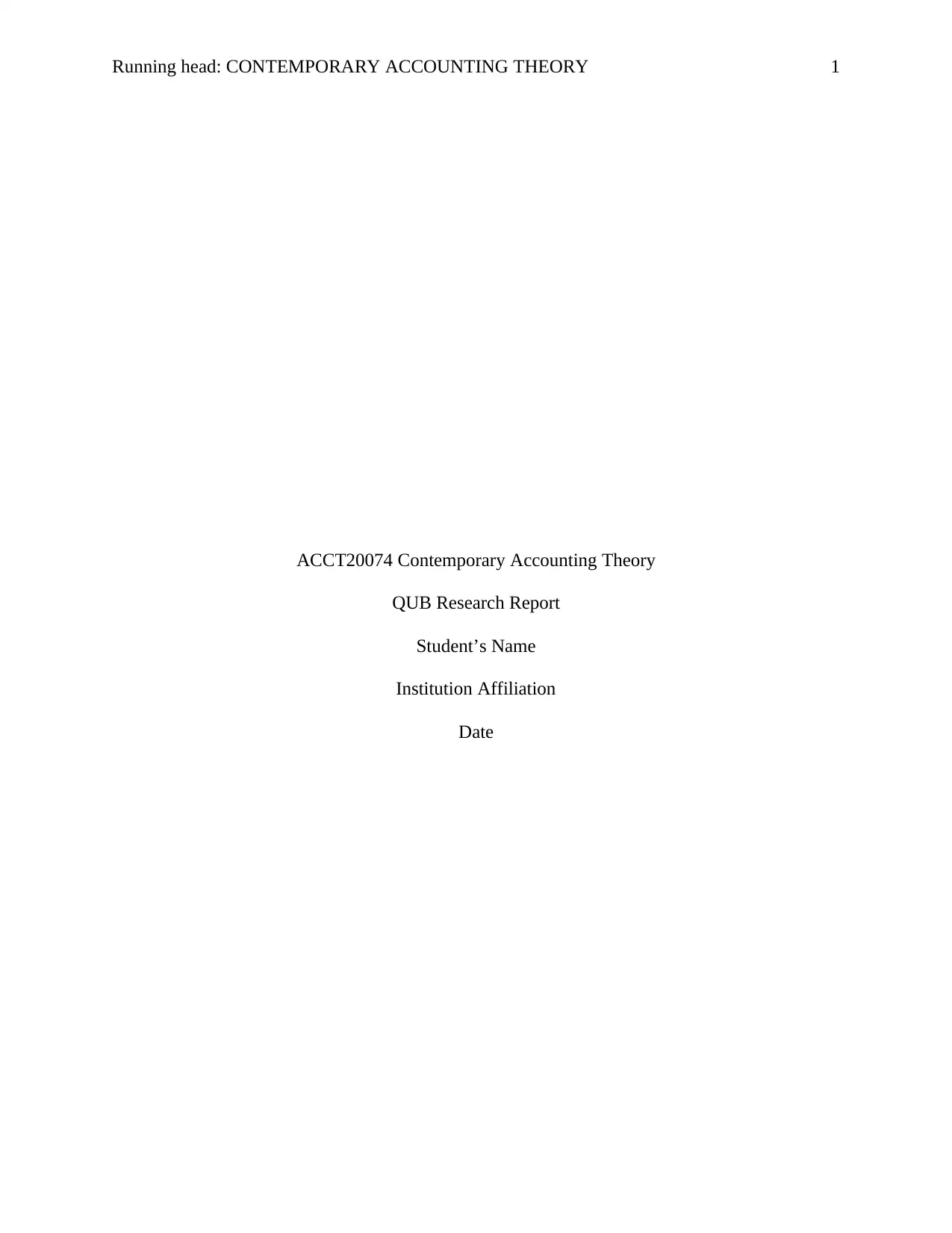
Running head: CONTEMPORARY ACCOUNTING THEORY 1
ACCT20074 Contemporary Accounting Theory
QUB Research Report
Student’s Name
Institution Affiliation
Date
ACCT20074 Contemporary Accounting Theory
QUB Research Report
Student’s Name
Institution Affiliation
Date
Secure Best Marks with AI Grader
Need help grading? Try our AI Grader for instant feedback on your assignments.
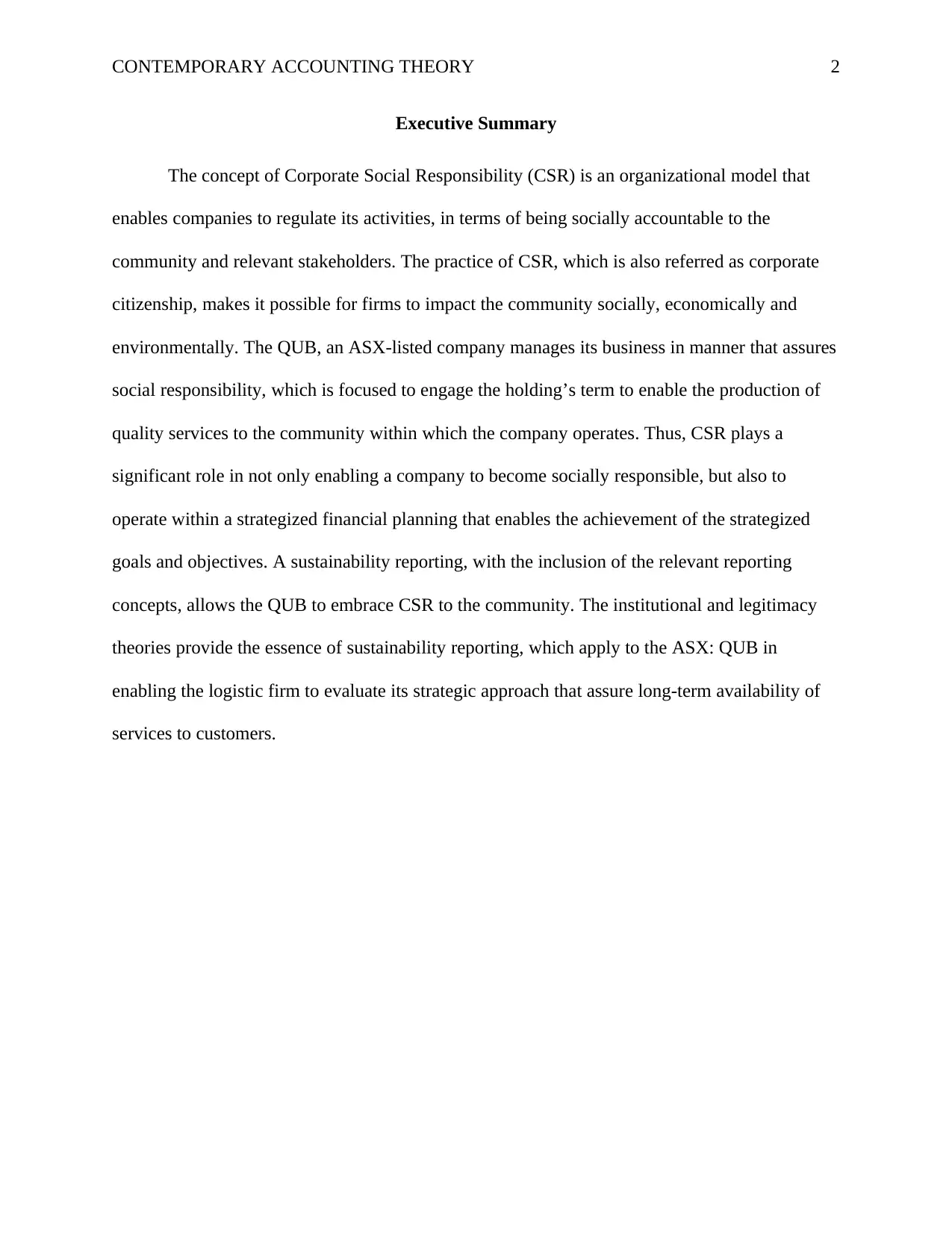
CONTEMPORARY ACCOUNTING THEORY 2
Executive Summary
The concept of Corporate Social Responsibility (CSR) is an organizational model that
enables companies to regulate its activities, in terms of being socially accountable to the
community and relevant stakeholders. The practice of CSR, which is also referred as corporate
citizenship, makes it possible for firms to impact the community socially, economically and
environmentally. The QUB, an ASX-listed company manages its business in manner that assures
social responsibility, which is focused to engage the holding’s term to enable the production of
quality services to the community within which the company operates. Thus, CSR plays a
significant role in not only enabling a company to become socially responsible, but also to
operate within a strategized financial planning that enables the achievement of the strategized
goals and objectives. A sustainability reporting, with the inclusion of the relevant reporting
concepts, allows the QUB to embrace CSR to the community. The institutional and legitimacy
theories provide the essence of sustainability reporting, which apply to the ASX: QUB in
enabling the logistic firm to evaluate its strategic approach that assure long-term availability of
services to customers.
Executive Summary
The concept of Corporate Social Responsibility (CSR) is an organizational model that
enables companies to regulate its activities, in terms of being socially accountable to the
community and relevant stakeholders. The practice of CSR, which is also referred as corporate
citizenship, makes it possible for firms to impact the community socially, economically and
environmentally. The QUB, an ASX-listed company manages its business in manner that assures
social responsibility, which is focused to engage the holding’s term to enable the production of
quality services to the community within which the company operates. Thus, CSR plays a
significant role in not only enabling a company to become socially responsible, but also to
operate within a strategized financial planning that enables the achievement of the strategized
goals and objectives. A sustainability reporting, with the inclusion of the relevant reporting
concepts, allows the QUB to embrace CSR to the community. The institutional and legitimacy
theories provide the essence of sustainability reporting, which apply to the ASX: QUB in
enabling the logistic firm to evaluate its strategic approach that assure long-term availability of
services to customers.
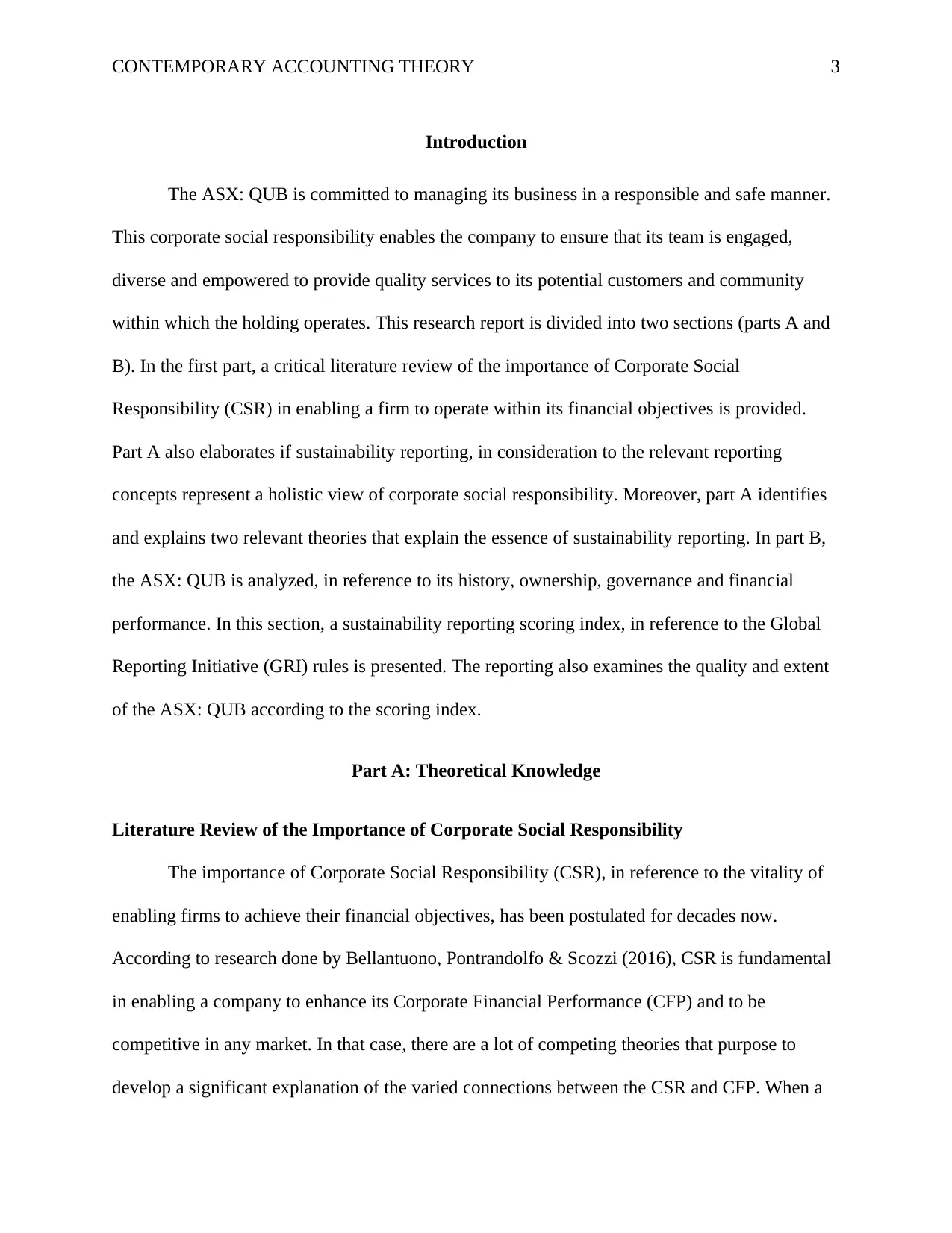
CONTEMPORARY ACCOUNTING THEORY 3
Introduction
The ASX: QUB is committed to managing its business in a responsible and safe manner.
This corporate social responsibility enables the company to ensure that its team is engaged,
diverse and empowered to provide quality services to its potential customers and community
within which the holding operates. This research report is divided into two sections (parts A and
B). In the first part, a critical literature review of the importance of Corporate Social
Responsibility (CSR) in enabling a firm to operate within its financial objectives is provided.
Part A also elaborates if sustainability reporting, in consideration to the relevant reporting
concepts represent a holistic view of corporate social responsibility. Moreover, part A identifies
and explains two relevant theories that explain the essence of sustainability reporting. In part B,
the ASX: QUB is analyzed, in reference to its history, ownership, governance and financial
performance. In this section, a sustainability reporting scoring index, in reference to the Global
Reporting Initiative (GRI) rules is presented. The reporting also examines the quality and extent
of the ASX: QUB according to the scoring index.
Part A: Theoretical Knowledge
Literature Review of the Importance of Corporate Social Responsibility
The importance of Corporate Social Responsibility (CSR), in reference to the vitality of
enabling firms to achieve their financial objectives, has been postulated for decades now.
According to research done by Bellantuono, Pontrandolfo & Scozzi (2016), CSR is fundamental
in enabling a company to enhance its Corporate Financial Performance (CFP) and to be
competitive in any market. In that case, there are a lot of competing theories that purpose to
develop a significant explanation of the varied connections between the CSR and CFP. When a
Introduction
The ASX: QUB is committed to managing its business in a responsible and safe manner.
This corporate social responsibility enables the company to ensure that its team is engaged,
diverse and empowered to provide quality services to its potential customers and community
within which the holding operates. This research report is divided into two sections (parts A and
B). In the first part, a critical literature review of the importance of Corporate Social
Responsibility (CSR) in enabling a firm to operate within its financial objectives is provided.
Part A also elaborates if sustainability reporting, in consideration to the relevant reporting
concepts represent a holistic view of corporate social responsibility. Moreover, part A identifies
and explains two relevant theories that explain the essence of sustainability reporting. In part B,
the ASX: QUB is analyzed, in reference to its history, ownership, governance and financial
performance. In this section, a sustainability reporting scoring index, in reference to the Global
Reporting Initiative (GRI) rules is presented. The reporting also examines the quality and extent
of the ASX: QUB according to the scoring index.
Part A: Theoretical Knowledge
Literature Review of the Importance of Corporate Social Responsibility
The importance of Corporate Social Responsibility (CSR), in reference to the vitality of
enabling firms to achieve their financial objectives, has been postulated for decades now.
According to research done by Bellantuono, Pontrandolfo & Scozzi (2016), CSR is fundamental
in enabling a company to enhance its Corporate Financial Performance (CFP) and to be
competitive in any market. In that case, there are a lot of competing theories that purpose to
develop a significant explanation of the varied connections between the CSR and CFP. When a
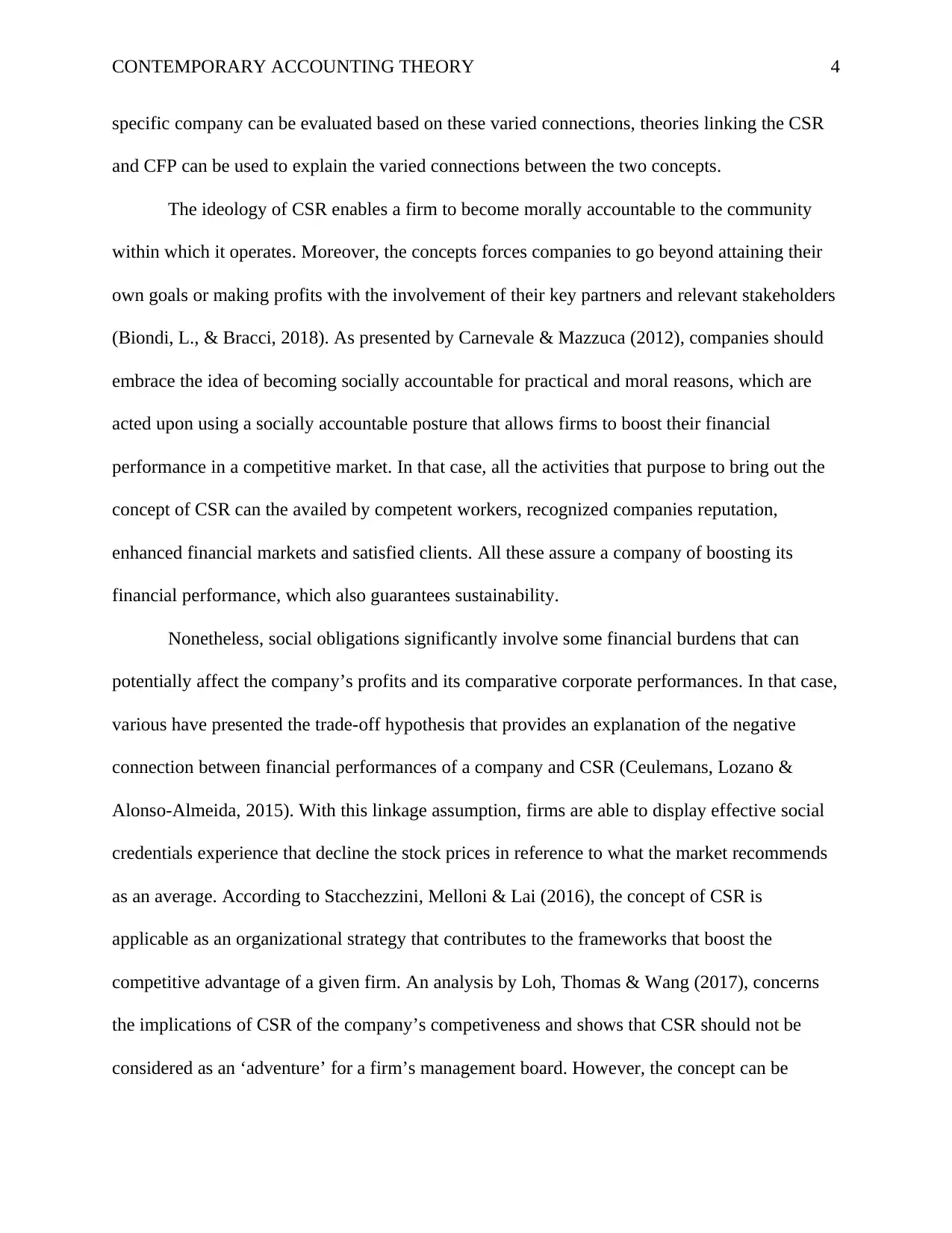
CONTEMPORARY ACCOUNTING THEORY 4
specific company can be evaluated based on these varied connections, theories linking the CSR
and CFP can be used to explain the varied connections between the two concepts.
The ideology of CSR enables a firm to become morally accountable to the community
within which it operates. Moreover, the concepts forces companies to go beyond attaining their
own goals or making profits with the involvement of their key partners and relevant stakeholders
(Biondi, L., & Bracci, 2018). As presented by Carnevale & Mazzuca (2012), companies should
embrace the idea of becoming socially accountable for practical and moral reasons, which are
acted upon using a socially accountable posture that allows firms to boost their financial
performance in a competitive market. In that case, all the activities that purpose to bring out the
concept of CSR can the availed by competent workers, recognized companies reputation,
enhanced financial markets and satisfied clients. All these assure a company of boosting its
financial performance, which also guarantees sustainability.
Nonetheless, social obligations significantly involve some financial burdens that can
potentially affect the company’s profits and its comparative corporate performances. In that case,
various have presented the trade-off hypothesis that provides an explanation of the negative
connection between financial performances of a company and CSR (Ceulemans, Lozano &
Alonso-Almeida, 2015). With this linkage assumption, firms are able to display effective social
credentials experience that decline the stock prices in reference to what the market recommends
as an average. According to Stacchezzini, Melloni & Lai (2016), the concept of CSR is
applicable as an organizational strategy that contributes to the frameworks that boost the
competitive advantage of a given firm. An analysis by Loh, Thomas & Wang (2017), concerns
the implications of CSR of the company’s competiveness and shows that CSR should not be
considered as an ‘adventure’ for a firm’s management board. However, the concept can be
specific company can be evaluated based on these varied connections, theories linking the CSR
and CFP can be used to explain the varied connections between the two concepts.
The ideology of CSR enables a firm to become morally accountable to the community
within which it operates. Moreover, the concepts forces companies to go beyond attaining their
own goals or making profits with the involvement of their key partners and relevant stakeholders
(Biondi, L., & Bracci, 2018). As presented by Carnevale & Mazzuca (2012), companies should
embrace the idea of becoming socially accountable for practical and moral reasons, which are
acted upon using a socially accountable posture that allows firms to boost their financial
performance in a competitive market. In that case, all the activities that purpose to bring out the
concept of CSR can the availed by competent workers, recognized companies reputation,
enhanced financial markets and satisfied clients. All these assure a company of boosting its
financial performance, which also guarantees sustainability.
Nonetheless, social obligations significantly involve some financial burdens that can
potentially affect the company’s profits and its comparative corporate performances. In that case,
various have presented the trade-off hypothesis that provides an explanation of the negative
connection between financial performances of a company and CSR (Ceulemans, Lozano &
Alonso-Almeida, 2015). With this linkage assumption, firms are able to display effective social
credentials experience that decline the stock prices in reference to what the market recommends
as an average. According to Stacchezzini, Melloni & Lai (2016), the concept of CSR is
applicable as an organizational strategy that contributes to the frameworks that boost the
competitive advantage of a given firm. An analysis by Loh, Thomas & Wang (2017), concerns
the implications of CSR of the company’s competiveness and shows that CSR should not be
considered as an ‘adventure’ for a firm’s management board. However, the concept can be
Secure Best Marks with AI Grader
Need help grading? Try our AI Grader for instant feedback on your assignments.
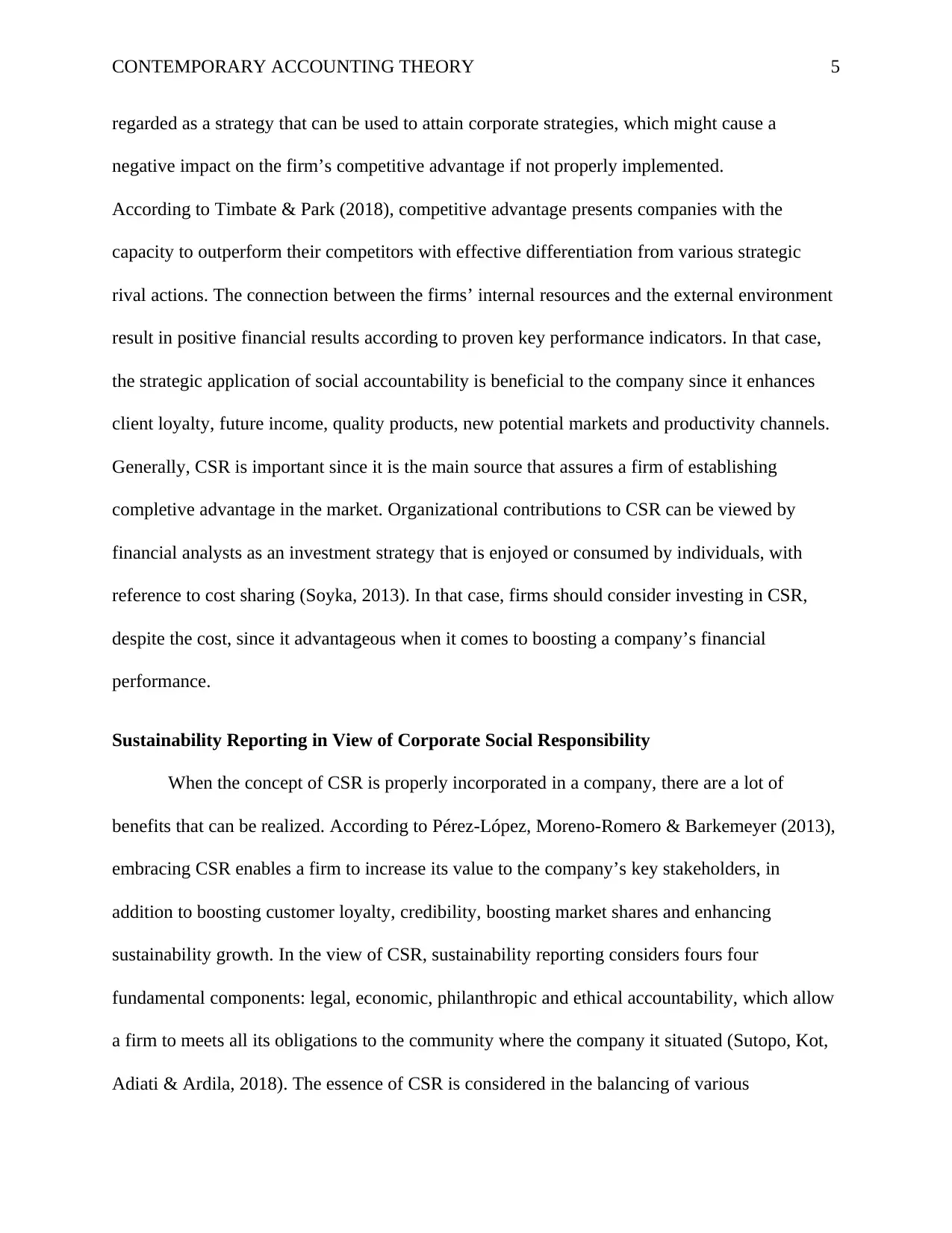
CONTEMPORARY ACCOUNTING THEORY 5
regarded as a strategy that can be used to attain corporate strategies, which might cause a
negative impact on the firm’s competitive advantage if not properly implemented.
According to Timbate & Park (2018), competitive advantage presents companies with the
capacity to outperform their competitors with effective differentiation from various strategic
rival actions. The connection between the firms’ internal resources and the external environment
result in positive financial results according to proven key performance indicators. In that case,
the strategic application of social accountability is beneficial to the company since it enhances
client loyalty, future income, quality products, new potential markets and productivity channels.
Generally, CSR is important since it is the main source that assures a firm of establishing
completive advantage in the market. Organizational contributions to CSR can be viewed by
financial analysts as an investment strategy that is enjoyed or consumed by individuals, with
reference to cost sharing (Soyka, 2013). In that case, firms should consider investing in CSR,
despite the cost, since it advantageous when it comes to boosting a company’s financial
performance.
Sustainability Reporting in View of Corporate Social Responsibility
When the concept of CSR is properly incorporated in a company, there are a lot of
benefits that can be realized. According to Pérez-López, Moreno-Romero & Barkemeyer (2013),
embracing CSR enables a firm to increase its value to the company’s key stakeholders, in
addition to boosting customer loyalty, credibility, boosting market shares and enhancing
sustainability growth. In the view of CSR, sustainability reporting considers fours four
fundamental components: legal, economic, philanthropic and ethical accountability, which allow
a firm to meets all its obligations to the community where the company it situated (Sutopo, Kot,
Adiati & Ardila, 2018). The essence of CSR is considered in the balancing of various
regarded as a strategy that can be used to attain corporate strategies, which might cause a
negative impact on the firm’s competitive advantage if not properly implemented.
According to Timbate & Park (2018), competitive advantage presents companies with the
capacity to outperform their competitors with effective differentiation from various strategic
rival actions. The connection between the firms’ internal resources and the external environment
result in positive financial results according to proven key performance indicators. In that case,
the strategic application of social accountability is beneficial to the company since it enhances
client loyalty, future income, quality products, new potential markets and productivity channels.
Generally, CSR is important since it is the main source that assures a firm of establishing
completive advantage in the market. Organizational contributions to CSR can be viewed by
financial analysts as an investment strategy that is enjoyed or consumed by individuals, with
reference to cost sharing (Soyka, 2013). In that case, firms should consider investing in CSR,
despite the cost, since it advantageous when it comes to boosting a company’s financial
performance.
Sustainability Reporting in View of Corporate Social Responsibility
When the concept of CSR is properly incorporated in a company, there are a lot of
benefits that can be realized. According to Pérez-López, Moreno-Romero & Barkemeyer (2013),
embracing CSR enables a firm to increase its value to the company’s key stakeholders, in
addition to boosting customer loyalty, credibility, boosting market shares and enhancing
sustainability growth. In the view of CSR, sustainability reporting considers fours four
fundamental components: legal, economic, philanthropic and ethical accountability, which allow
a firm to meets all its obligations to the community where the company it situated (Sutopo, Kot,
Adiati & Ardila, 2018). The essence of CSR is considered in the balancing of various
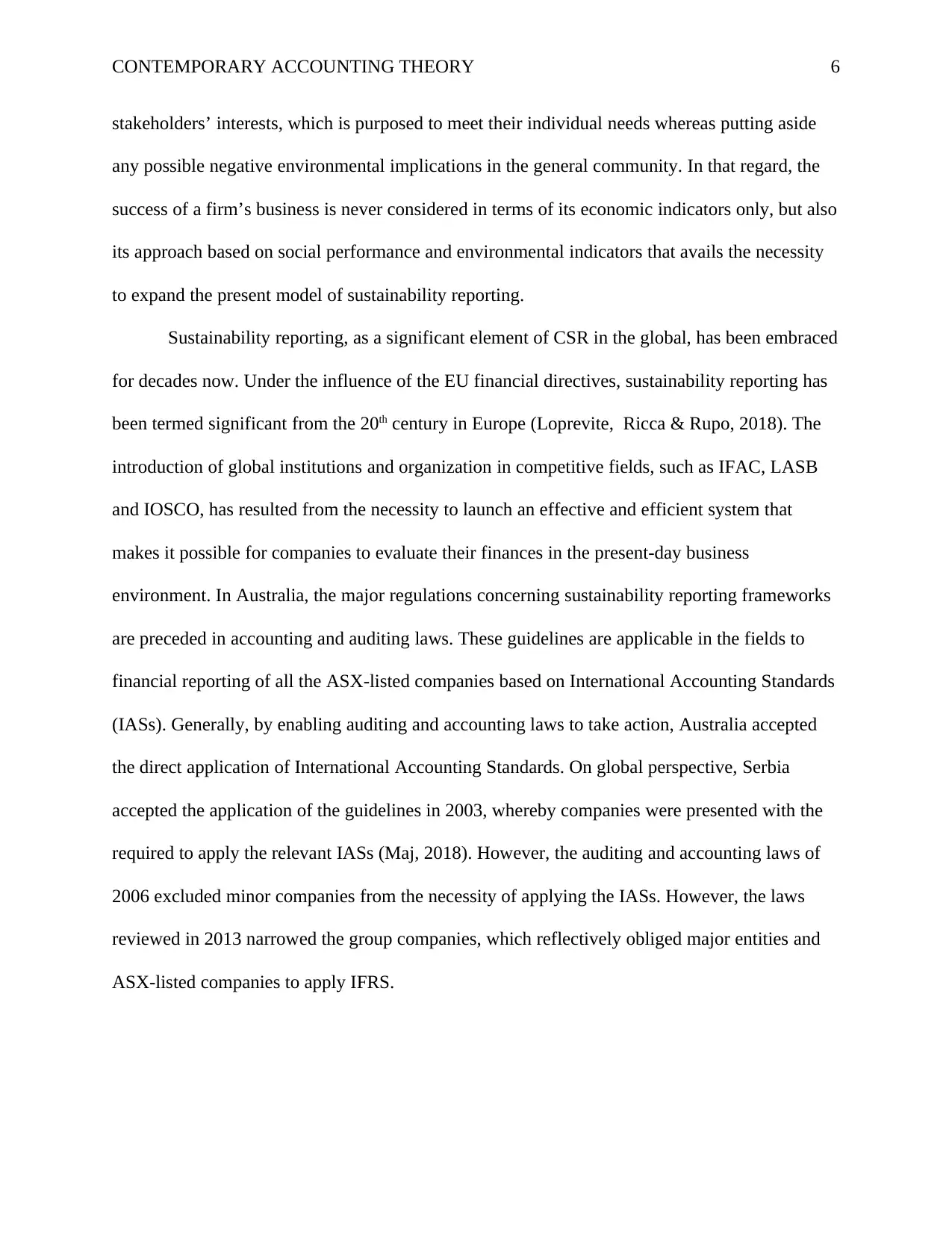
CONTEMPORARY ACCOUNTING THEORY 6
stakeholders’ interests, which is purposed to meet their individual needs whereas putting aside
any possible negative environmental implications in the general community. In that regard, the
success of a firm’s business is never considered in terms of its economic indicators only, but also
its approach based on social performance and environmental indicators that avails the necessity
to expand the present model of sustainability reporting.
Sustainability reporting, as a significant element of CSR in the global, has been embraced
for decades now. Under the influence of the EU financial directives, sustainability reporting has
been termed significant from the 20th century in Europe (Loprevite, Ricca & Rupo, 2018). The
introduction of global institutions and organization in competitive fields, such as IFAC, LASB
and IOSCO, has resulted from the necessity to launch an effective and efficient system that
makes it possible for companies to evaluate their finances in the present-day business
environment. In Australia, the major regulations concerning sustainability reporting frameworks
are preceded in accounting and auditing laws. These guidelines are applicable in the fields to
financial reporting of all the ASX-listed companies based on International Accounting Standards
(IASs). Generally, by enabling auditing and accounting laws to take action, Australia accepted
the direct application of International Accounting Standards. On global perspective, Serbia
accepted the application of the guidelines in 2003, whereby companies were presented with the
required to apply the relevant IASs (Maj, 2018). However, the auditing and accounting laws of
2006 excluded minor companies from the necessity of applying the IASs. However, the laws
reviewed in 2013 narrowed the group companies, which reflectively obliged major entities and
ASX-listed companies to apply IFRS.
stakeholders’ interests, which is purposed to meet their individual needs whereas putting aside
any possible negative environmental implications in the general community. In that regard, the
success of a firm’s business is never considered in terms of its economic indicators only, but also
its approach based on social performance and environmental indicators that avails the necessity
to expand the present model of sustainability reporting.
Sustainability reporting, as a significant element of CSR in the global, has been embraced
for decades now. Under the influence of the EU financial directives, sustainability reporting has
been termed significant from the 20th century in Europe (Loprevite, Ricca & Rupo, 2018). The
introduction of global institutions and organization in competitive fields, such as IFAC, LASB
and IOSCO, has resulted from the necessity to launch an effective and efficient system that
makes it possible for companies to evaluate their finances in the present-day business
environment. In Australia, the major regulations concerning sustainability reporting frameworks
are preceded in accounting and auditing laws. These guidelines are applicable in the fields to
financial reporting of all the ASX-listed companies based on International Accounting Standards
(IASs). Generally, by enabling auditing and accounting laws to take action, Australia accepted
the direct application of International Accounting Standards. On global perspective, Serbia
accepted the application of the guidelines in 2003, whereby companies were presented with the
required to apply the relevant IASs (Maj, 2018). However, the auditing and accounting laws of
2006 excluded minor companies from the necessity of applying the IASs. However, the laws
reviewed in 2013 narrowed the group companies, which reflectively obliged major entities and
ASX-listed companies to apply IFRS.
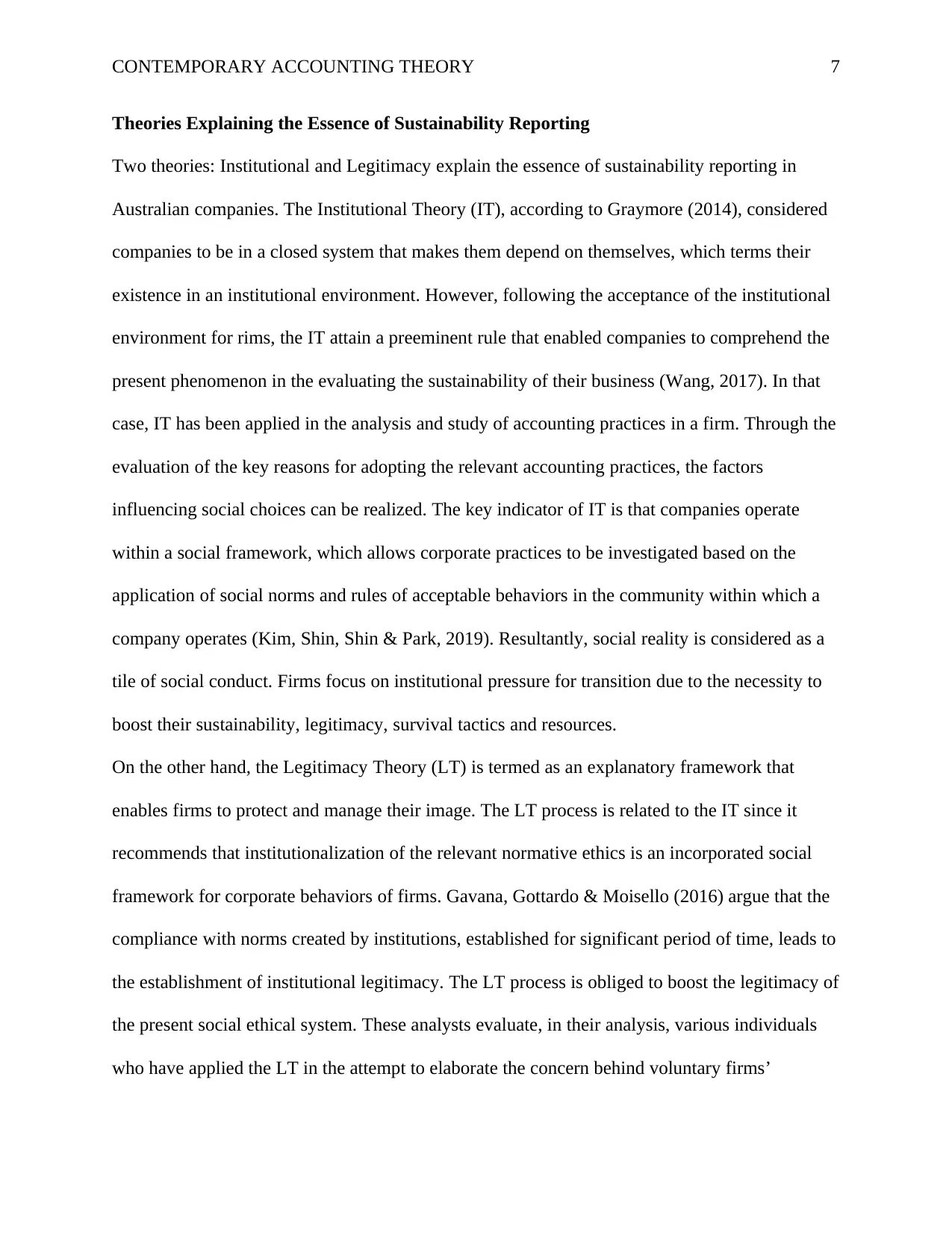
CONTEMPORARY ACCOUNTING THEORY 7
Theories Explaining the Essence of Sustainability Reporting
Two theories: Institutional and Legitimacy explain the essence of sustainability reporting in
Australian companies. The Institutional Theory (IT), according to Graymore (2014), considered
companies to be in a closed system that makes them depend on themselves, which terms their
existence in an institutional environment. However, following the acceptance of the institutional
environment for rims, the IT attain a preeminent rule that enabled companies to comprehend the
present phenomenon in the evaluating the sustainability of their business (Wang, 2017). In that
case, IT has been applied in the analysis and study of accounting practices in a firm. Through the
evaluation of the key reasons for adopting the relevant accounting practices, the factors
influencing social choices can be realized. The key indicator of IT is that companies operate
within a social framework, which allows corporate practices to be investigated based on the
application of social norms and rules of acceptable behaviors in the community within which a
company operates (Kim, Shin, Shin & Park, 2019). Resultantly, social reality is considered as a
tile of social conduct. Firms focus on institutional pressure for transition due to the necessity to
boost their sustainability, legitimacy, survival tactics and resources.
On the other hand, the Legitimacy Theory (LT) is termed as an explanatory framework that
enables firms to protect and manage their image. The LT process is related to the IT since it
recommends that institutionalization of the relevant normative ethics is an incorporated social
framework for corporate behaviors of firms. Gavana, Gottardo & Moisello (2016) argue that the
compliance with norms created by institutions, established for significant period of time, leads to
the establishment of institutional legitimacy. The LT process is obliged to boost the legitimacy of
the present social ethical system. These analysts evaluate, in their analysis, various individuals
who have applied the LT in the attempt to elaborate the concern behind voluntary firms’
Theories Explaining the Essence of Sustainability Reporting
Two theories: Institutional and Legitimacy explain the essence of sustainability reporting in
Australian companies. The Institutional Theory (IT), according to Graymore (2014), considered
companies to be in a closed system that makes them depend on themselves, which terms their
existence in an institutional environment. However, following the acceptance of the institutional
environment for rims, the IT attain a preeminent rule that enabled companies to comprehend the
present phenomenon in the evaluating the sustainability of their business (Wang, 2017). In that
case, IT has been applied in the analysis and study of accounting practices in a firm. Through the
evaluation of the key reasons for adopting the relevant accounting practices, the factors
influencing social choices can be realized. The key indicator of IT is that companies operate
within a social framework, which allows corporate practices to be investigated based on the
application of social norms and rules of acceptable behaviors in the community within which a
company operates (Kim, Shin, Shin & Park, 2019). Resultantly, social reality is considered as a
tile of social conduct. Firms focus on institutional pressure for transition due to the necessity to
boost their sustainability, legitimacy, survival tactics and resources.
On the other hand, the Legitimacy Theory (LT) is termed as an explanatory framework that
enables firms to protect and manage their image. The LT process is related to the IT since it
recommends that institutionalization of the relevant normative ethics is an incorporated social
framework for corporate behaviors of firms. Gavana, Gottardo & Moisello (2016) argue that the
compliance with norms created by institutions, established for significant period of time, leads to
the establishment of institutional legitimacy. The LT process is obliged to boost the legitimacy of
the present social ethical system. These analysts evaluate, in their analysis, various individuals
who have applied the LT in the attempt to elaborate the concern behind voluntary firms’
Paraphrase This Document
Need a fresh take? Get an instant paraphrase of this document with our AI Paraphraser
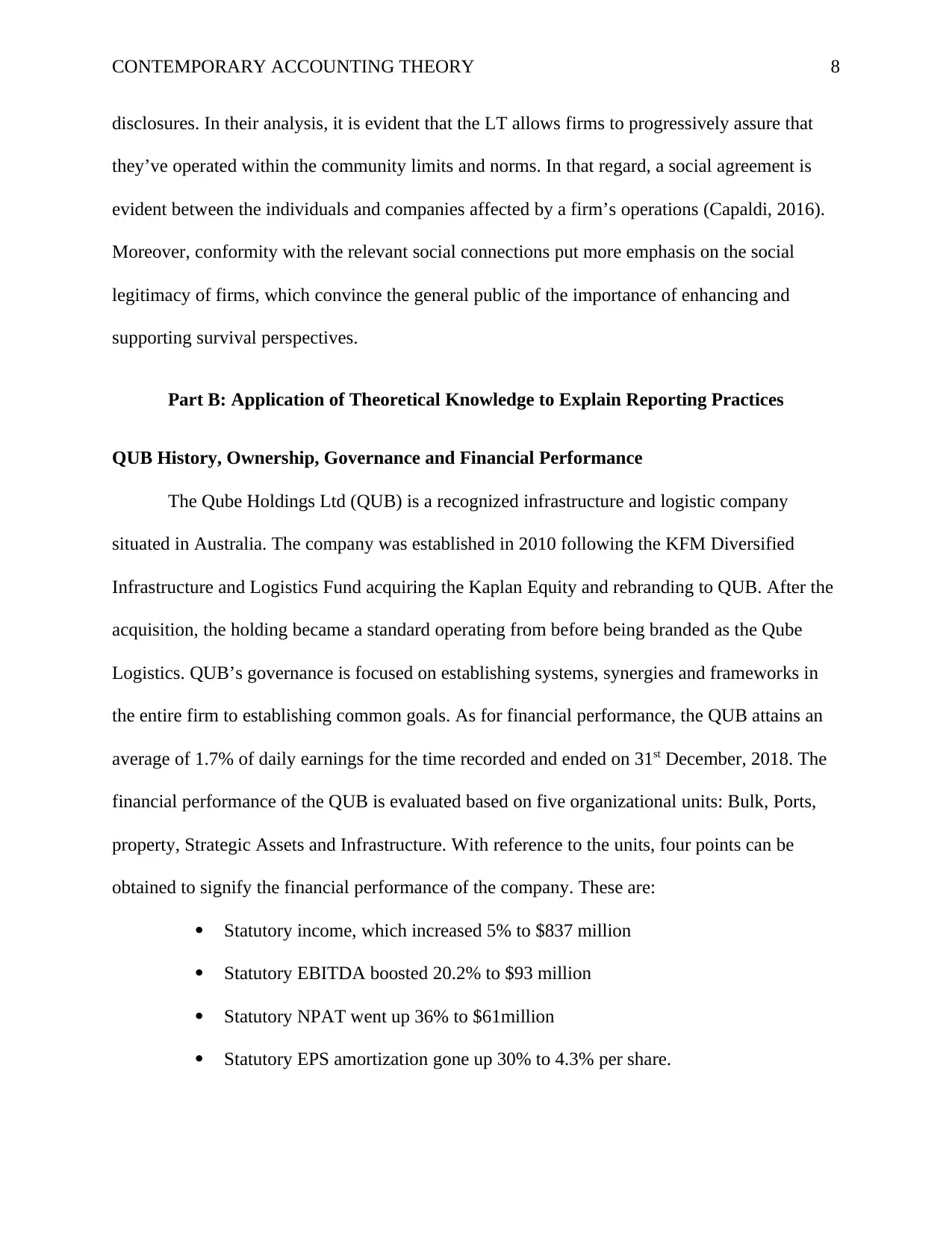
CONTEMPORARY ACCOUNTING THEORY 8
disclosures. In their analysis, it is evident that the LT allows firms to progressively assure that
they’ve operated within the community limits and norms. In that regard, a social agreement is
evident between the individuals and companies affected by a firm’s operations (Capaldi, 2016).
Moreover, conformity with the relevant social connections put more emphasis on the social
legitimacy of firms, which convince the general public of the importance of enhancing and
supporting survival perspectives.
Part B: Application of Theoretical Knowledge to Explain Reporting Practices
QUB History, Ownership, Governance and Financial Performance
The Qube Holdings Ltd (QUB) is a recognized infrastructure and logistic company
situated in Australia. The company was established in 2010 following the KFM Diversified
Infrastructure and Logistics Fund acquiring the Kaplan Equity and rebranding to QUB. After the
acquisition, the holding became a standard operating from before being branded as the Qube
Logistics. QUB’s governance is focused on establishing systems, synergies and frameworks in
the entire firm to establishing common goals. As for financial performance, the QUB attains an
average of 1.7% of daily earnings for the time recorded and ended on 31st December, 2018. The
financial performance of the QUB is evaluated based on five organizational units: Bulk, Ports,
property, Strategic Assets and Infrastructure. With reference to the units, four points can be
obtained to signify the financial performance of the company. These are:
Statutory income, which increased 5% to $837 million
Statutory EBITDA boosted 20.2% to $93 million
Statutory NPAT went up 36% to $61million
Statutory EPS amortization gone up 30% to 4.3% per share.
disclosures. In their analysis, it is evident that the LT allows firms to progressively assure that
they’ve operated within the community limits and norms. In that regard, a social agreement is
evident between the individuals and companies affected by a firm’s operations (Capaldi, 2016).
Moreover, conformity with the relevant social connections put more emphasis on the social
legitimacy of firms, which convince the general public of the importance of enhancing and
supporting survival perspectives.
Part B: Application of Theoretical Knowledge to Explain Reporting Practices
QUB History, Ownership, Governance and Financial Performance
The Qube Holdings Ltd (QUB) is a recognized infrastructure and logistic company
situated in Australia. The company was established in 2010 following the KFM Diversified
Infrastructure and Logistics Fund acquiring the Kaplan Equity and rebranding to QUB. After the
acquisition, the holding became a standard operating from before being branded as the Qube
Logistics. QUB’s governance is focused on establishing systems, synergies and frameworks in
the entire firm to establishing common goals. As for financial performance, the QUB attains an
average of 1.7% of daily earnings for the time recorded and ended on 31st December, 2018. The
financial performance of the QUB is evaluated based on five organizational units: Bulk, Ports,
property, Strategic Assets and Infrastructure. With reference to the units, four points can be
obtained to signify the financial performance of the company. These are:
Statutory income, which increased 5% to $837 million
Statutory EBITDA boosted 20.2% to $93 million
Statutory NPAT went up 36% to $61million
Statutory EPS amortization gone up 30% to 4.3% per share.
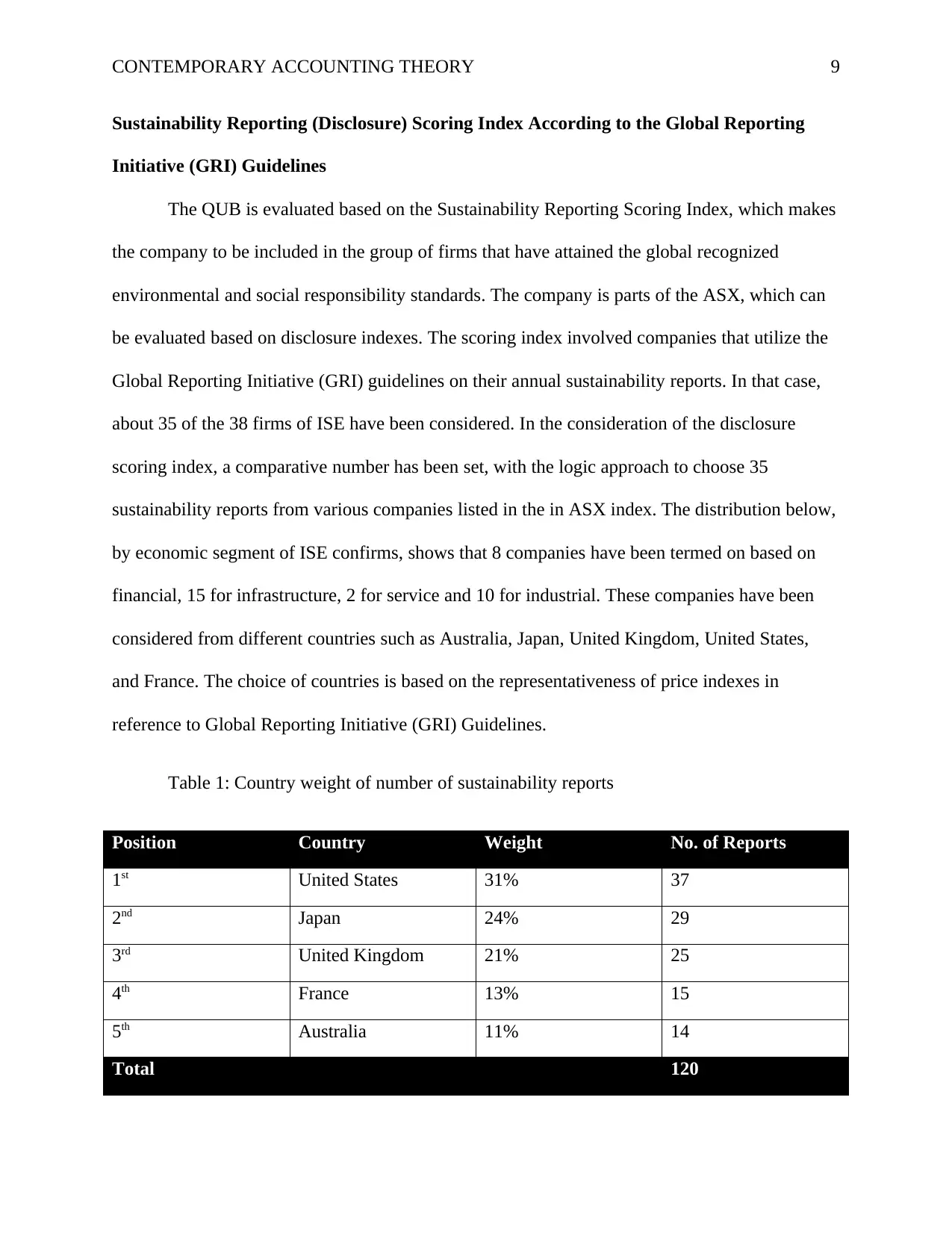
CONTEMPORARY ACCOUNTING THEORY 9
Sustainability Reporting (Disclosure) Scoring Index According to the Global Reporting
Initiative (GRI) Guidelines
The QUB is evaluated based on the Sustainability Reporting Scoring Index, which makes
the company to be included in the group of firms that have attained the global recognized
environmental and social responsibility standards. The company is parts of the ASX, which can
be evaluated based on disclosure indexes. The scoring index involved companies that utilize the
Global Reporting Initiative (GRI) guidelines on their annual sustainability reports. In that case,
about 35 of the 38 firms of ISE have been considered. In the consideration of the disclosure
scoring index, a comparative number has been set, with the logic approach to choose 35
sustainability reports from various companies listed in the in ASX index. The distribution below,
by economic segment of ISE confirms, shows that 8 companies have been termed on based on
financial, 15 for infrastructure, 2 for service and 10 for industrial. These companies have been
considered from different countries such as Australia, Japan, United Kingdom, United States,
and France. The choice of countries is based on the representativeness of price indexes in
reference to Global Reporting Initiative (GRI) Guidelines.
Table 1: Country weight of number of sustainability reports
Position Country Weight No. of Reports
1st United States 31% 37
2nd Japan 24% 29
3rd United Kingdom 21% 25
4th France 13% 15
5th Australia 11% 14
Total 120
Sustainability Reporting (Disclosure) Scoring Index According to the Global Reporting
Initiative (GRI) Guidelines
The QUB is evaluated based on the Sustainability Reporting Scoring Index, which makes
the company to be included in the group of firms that have attained the global recognized
environmental and social responsibility standards. The company is parts of the ASX, which can
be evaluated based on disclosure indexes. The scoring index involved companies that utilize the
Global Reporting Initiative (GRI) guidelines on their annual sustainability reports. In that case,
about 35 of the 38 firms of ISE have been considered. In the consideration of the disclosure
scoring index, a comparative number has been set, with the logic approach to choose 35
sustainability reports from various companies listed in the in ASX index. The distribution below,
by economic segment of ISE confirms, shows that 8 companies have been termed on based on
financial, 15 for infrastructure, 2 for service and 10 for industrial. These companies have been
considered from different countries such as Australia, Japan, United Kingdom, United States,
and France. The choice of countries is based on the representativeness of price indexes in
reference to Global Reporting Initiative (GRI) Guidelines.
Table 1: Country weight of number of sustainability reports
Position Country Weight No. of Reports
1st United States 31% 37
2nd Japan 24% 29
3rd United Kingdom 21% 25
4th France 13% 15
5th Australia 11% 14
Total 120
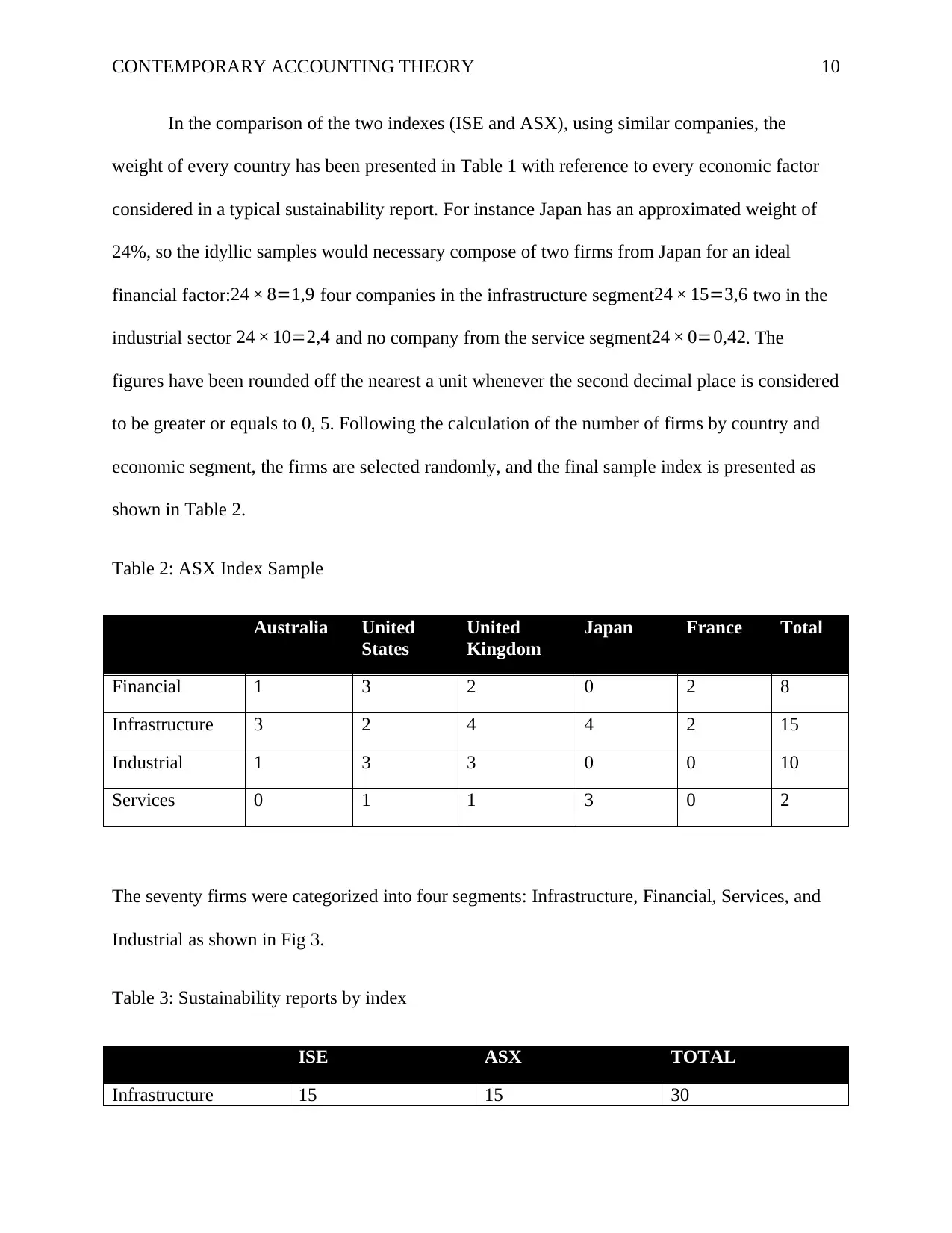
CONTEMPORARY ACCOUNTING THEORY 10
In the comparison of the two indexes (ISE and ASX), using similar companies, the
weight of every country has been presented in Table 1 with reference to every economic factor
considered in a typical sustainability report. For instance Japan has an approximated weight of
24%, so the idyllic samples would necessary compose of two firms from Japan for an ideal
financial factor:24 × 8=1,9 four companies in the infrastructure segment 24 × 15=3,6 two in the
industrial sector 24 × 10=2,4 and no company from the service segment 24 × 0=0,42. The
figures have been rounded off the nearest a unit whenever the second decimal place is considered
to be greater or equals to 0, 5. Following the calculation of the number of firms by country and
economic segment, the firms are selected randomly, and the final sample index is presented as
shown in Table 2.
Table 2: ASX Index Sample
Australia United
States
United
Kingdom
Japan France Total
Financial 1 3 2 0 2 8
Infrastructure 3 2 4 4 2 15
Industrial 1 3 3 0 0 10
Services 0 1 1 3 0 2
The seventy firms were categorized into four segments: Infrastructure, Financial, Services, and
Industrial as shown in Fig 3.
Table 3: Sustainability reports by index
ISE ASX TOTAL
Infrastructure 15 15 30
In the comparison of the two indexes (ISE and ASX), using similar companies, the
weight of every country has been presented in Table 1 with reference to every economic factor
considered in a typical sustainability report. For instance Japan has an approximated weight of
24%, so the idyllic samples would necessary compose of two firms from Japan for an ideal
financial factor:24 × 8=1,9 four companies in the infrastructure segment 24 × 15=3,6 two in the
industrial sector 24 × 10=2,4 and no company from the service segment 24 × 0=0,42. The
figures have been rounded off the nearest a unit whenever the second decimal place is considered
to be greater or equals to 0, 5. Following the calculation of the number of firms by country and
economic segment, the firms are selected randomly, and the final sample index is presented as
shown in Table 2.
Table 2: ASX Index Sample
Australia United
States
United
Kingdom
Japan France Total
Financial 1 3 2 0 2 8
Infrastructure 3 2 4 4 2 15
Industrial 1 3 3 0 0 10
Services 0 1 1 3 0 2
The seventy firms were categorized into four segments: Infrastructure, Financial, Services, and
Industrial as shown in Fig 3.
Table 3: Sustainability reports by index
ISE ASX TOTAL
Infrastructure 15 15 30
Secure Best Marks with AI Grader
Need help grading? Try our AI Grader for instant feedback on your assignments.
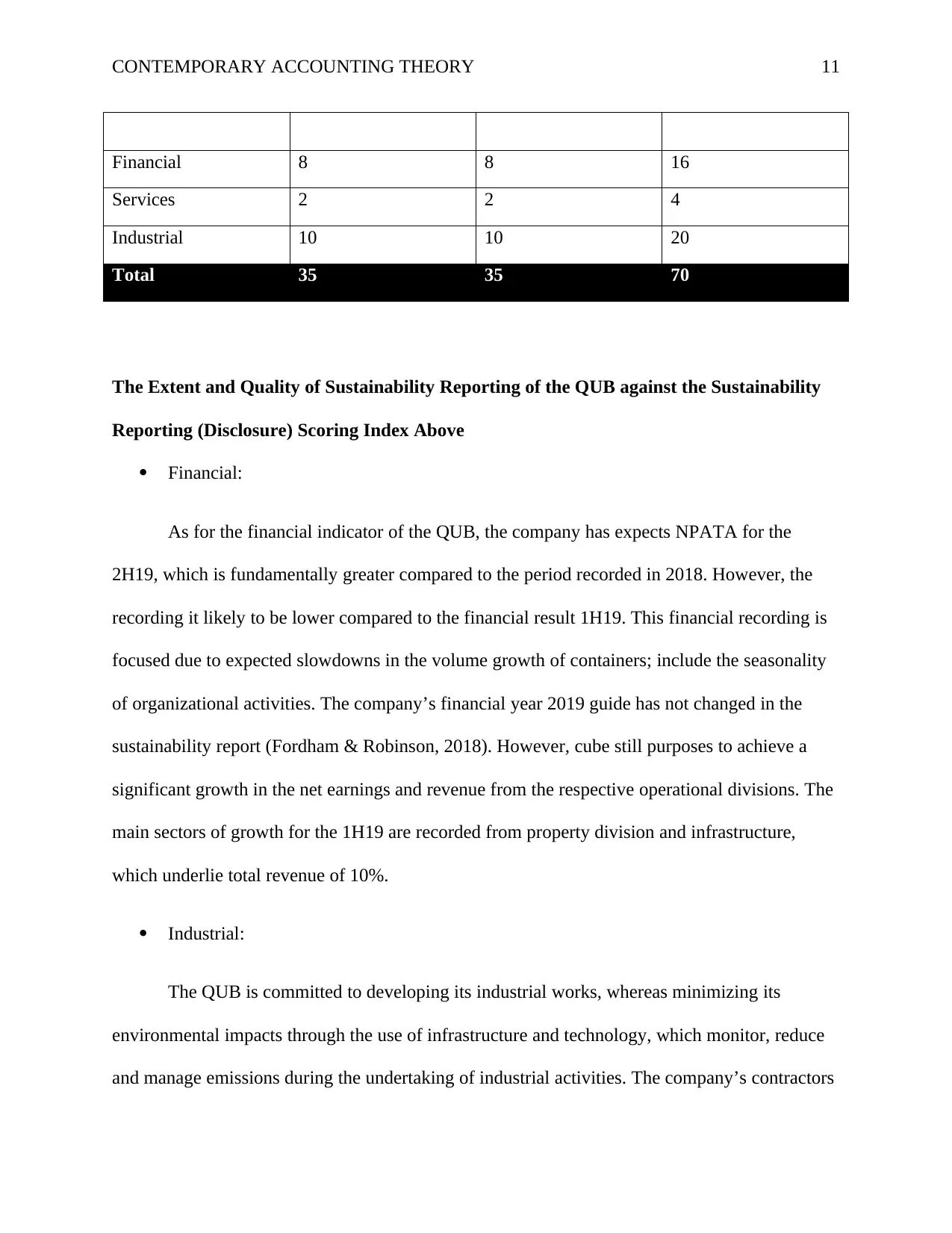
CONTEMPORARY ACCOUNTING THEORY 11
Financial 8 8 16
Services 2 2 4
Industrial 10 10 20
Total 35 35 70
The Extent and Quality of Sustainability Reporting of the QUB against the Sustainability
Reporting (Disclosure) Scoring Index Above
Financial:
As for the financial indicator of the QUB, the company has expects NPATA for the
2H19, which is fundamentally greater compared to the period recorded in 2018. However, the
recording it likely to be lower compared to the financial result 1H19. This financial recording is
focused due to expected slowdowns in the volume growth of containers; include the seasonality
of organizational activities. The company’s financial year 2019 guide has not changed in the
sustainability report (Fordham & Robinson, 2018). However, cube still purposes to achieve a
significant growth in the net earnings and revenue from the respective operational divisions. The
main sectors of growth for the 1H19 are recorded from property division and infrastructure,
which underlie total revenue of 10%.
Industrial:
The QUB is committed to developing its industrial works, whereas minimizing its
environmental impacts through the use of infrastructure and technology, which monitor, reduce
and manage emissions during the undertaking of industrial activities. The company’s contractors
Financial 8 8 16
Services 2 2 4
Industrial 10 10 20
Total 35 35 70
The Extent and Quality of Sustainability Reporting of the QUB against the Sustainability
Reporting (Disclosure) Scoring Index Above
Financial:
As for the financial indicator of the QUB, the company has expects NPATA for the
2H19, which is fundamentally greater compared to the period recorded in 2018. However, the
recording it likely to be lower compared to the financial result 1H19. This financial recording is
focused due to expected slowdowns in the volume growth of containers; include the seasonality
of organizational activities. The company’s financial year 2019 guide has not changed in the
sustainability report (Fordham & Robinson, 2018). However, cube still purposes to achieve a
significant growth in the net earnings and revenue from the respective operational divisions. The
main sectors of growth for the 1H19 are recorded from property division and infrastructure,
which underlie total revenue of 10%.
Industrial:
The QUB is committed to developing its industrial works, whereas minimizing its
environmental impacts through the use of infrastructure and technology, which monitor, reduce
and manage emissions during the undertaking of industrial activities. The company’s contractors
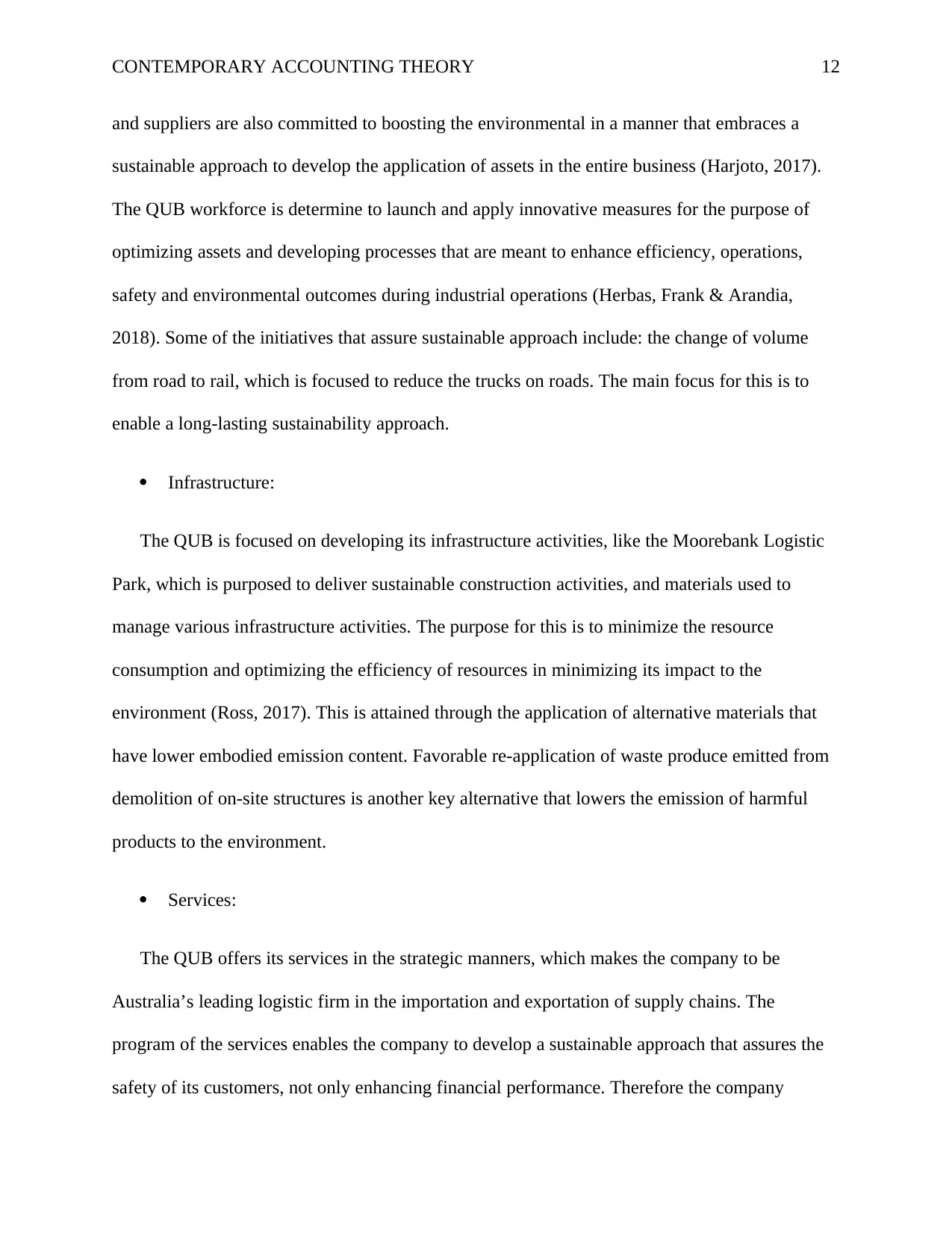
CONTEMPORARY ACCOUNTING THEORY 12
and suppliers are also committed to boosting the environmental in a manner that embraces a
sustainable approach to develop the application of assets in the entire business (Harjoto, 2017).
The QUB workforce is determine to launch and apply innovative measures for the purpose of
optimizing assets and developing processes that are meant to enhance efficiency, operations,
safety and environmental outcomes during industrial operations (Herbas, Frank & Arandia,
2018). Some of the initiatives that assure sustainable approach include: the change of volume
from road to rail, which is focused to reduce the trucks on roads. The main focus for this is to
enable a long-lasting sustainability approach.
Infrastructure:
The QUB is focused on developing its infrastructure activities, like the Moorebank Logistic
Park, which is purposed to deliver sustainable construction activities, and materials used to
manage various infrastructure activities. The purpose for this is to minimize the resource
consumption and optimizing the efficiency of resources in minimizing its impact to the
environment (Ross, 2017). This is attained through the application of alternative materials that
have lower embodied emission content. Favorable re-application of waste produce emitted from
demolition of on-site structures is another key alternative that lowers the emission of harmful
products to the environment.
Services:
The QUB offers its services in the strategic manners, which makes the company to be
Australia’s leading logistic firm in the importation and exportation of supply chains. The
program of the services enables the company to develop a sustainable approach that assures the
safety of its customers, not only enhancing financial performance. Therefore the company
and suppliers are also committed to boosting the environmental in a manner that embraces a
sustainable approach to develop the application of assets in the entire business (Harjoto, 2017).
The QUB workforce is determine to launch and apply innovative measures for the purpose of
optimizing assets and developing processes that are meant to enhance efficiency, operations,
safety and environmental outcomes during industrial operations (Herbas, Frank & Arandia,
2018). Some of the initiatives that assure sustainable approach include: the change of volume
from road to rail, which is focused to reduce the trucks on roads. The main focus for this is to
enable a long-lasting sustainability approach.
Infrastructure:
The QUB is focused on developing its infrastructure activities, like the Moorebank Logistic
Park, which is purposed to deliver sustainable construction activities, and materials used to
manage various infrastructure activities. The purpose for this is to minimize the resource
consumption and optimizing the efficiency of resources in minimizing its impact to the
environment (Ross, 2017). This is attained through the application of alternative materials that
have lower embodied emission content. Favorable re-application of waste produce emitted from
demolition of on-site structures is another key alternative that lowers the emission of harmful
products to the environment.
Services:
The QUB offers its services in the strategic manners, which makes the company to be
Australia’s leading logistic firm in the importation and exportation of supply chains. The
program of the services enables the company to develop a sustainable approach that assures the
safety of its customers, not only enhancing financial performance. Therefore the company
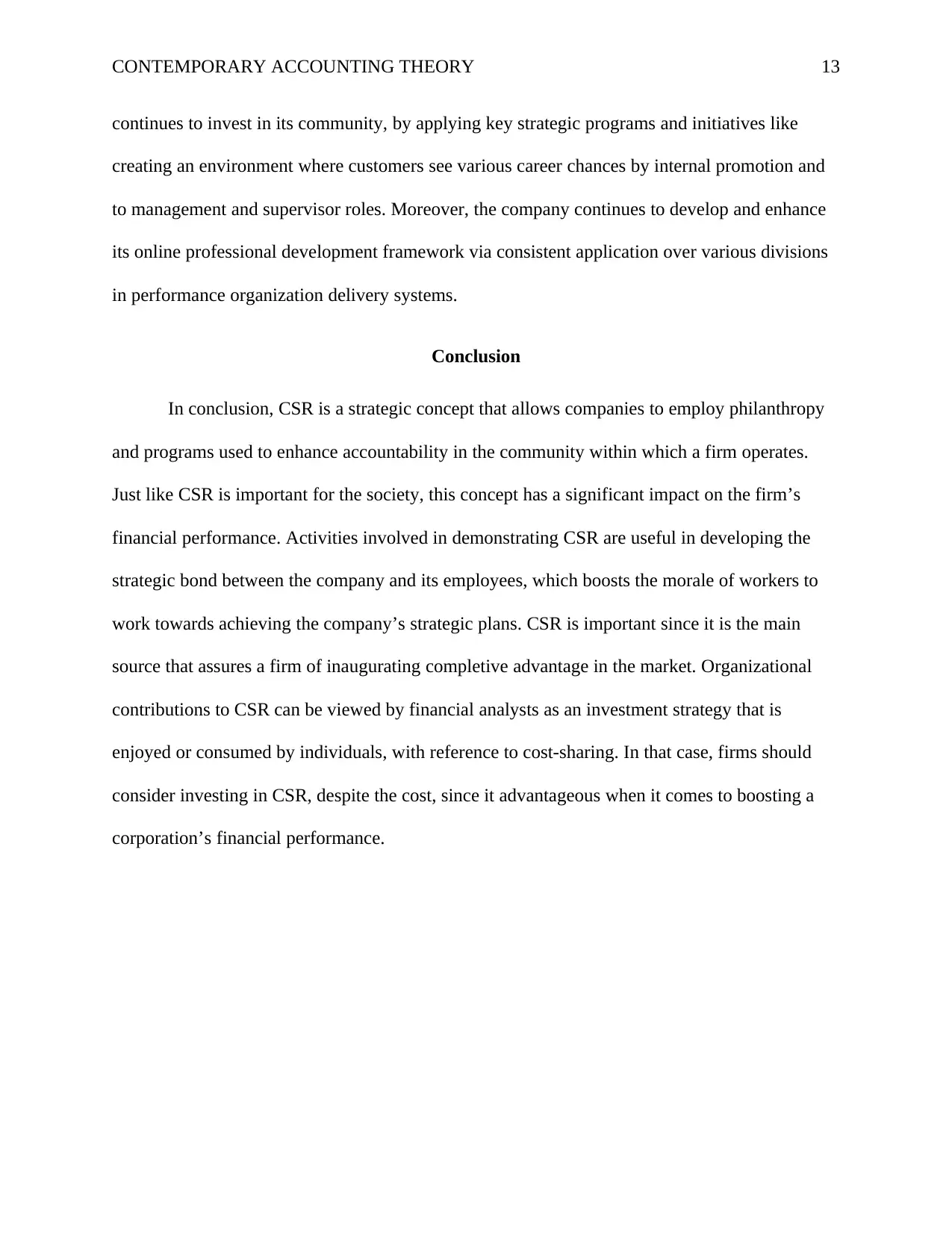
CONTEMPORARY ACCOUNTING THEORY 13
continues to invest in its community, by applying key strategic programs and initiatives like
creating an environment where customers see various career chances by internal promotion and
to management and supervisor roles. Moreover, the company continues to develop and enhance
its online professional development framework via consistent application over various divisions
in performance organization delivery systems.
Conclusion
In conclusion, CSR is a strategic concept that allows companies to employ philanthropy
and programs used to enhance accountability in the community within which a firm operates.
Just like CSR is important for the society, this concept has a significant impact on the firm’s
financial performance. Activities involved in demonstrating CSR are useful in developing the
strategic bond between the company and its employees, which boosts the morale of workers to
work towards achieving the company’s strategic plans. CSR is important since it is the main
source that assures a firm of inaugurating completive advantage in the market. Organizational
contributions to CSR can be viewed by financial analysts as an investment strategy that is
enjoyed or consumed by individuals, with reference to cost-sharing. In that case, firms should
consider investing in CSR, despite the cost, since it advantageous when it comes to boosting a
corporation’s financial performance.
continues to invest in its community, by applying key strategic programs and initiatives like
creating an environment where customers see various career chances by internal promotion and
to management and supervisor roles. Moreover, the company continues to develop and enhance
its online professional development framework via consistent application over various divisions
in performance organization delivery systems.
Conclusion
In conclusion, CSR is a strategic concept that allows companies to employ philanthropy
and programs used to enhance accountability in the community within which a firm operates.
Just like CSR is important for the society, this concept has a significant impact on the firm’s
financial performance. Activities involved in demonstrating CSR are useful in developing the
strategic bond between the company and its employees, which boosts the morale of workers to
work towards achieving the company’s strategic plans. CSR is important since it is the main
source that assures a firm of inaugurating completive advantage in the market. Organizational
contributions to CSR can be viewed by financial analysts as an investment strategy that is
enjoyed or consumed by individuals, with reference to cost-sharing. In that case, firms should
consider investing in CSR, despite the cost, since it advantageous when it comes to boosting a
corporation’s financial performance.
Paraphrase This Document
Need a fresh take? Get an instant paraphrase of this document with our AI Paraphraser
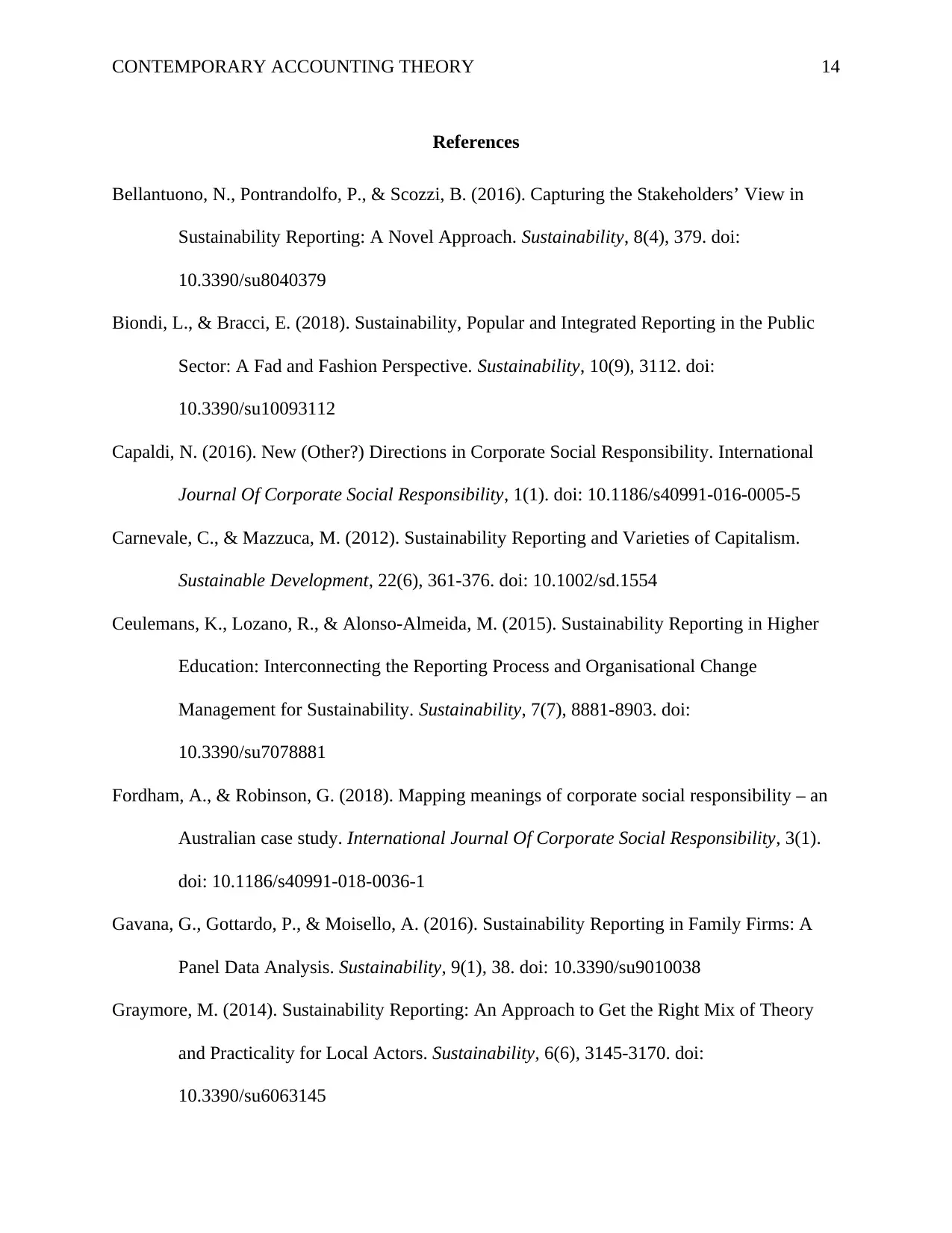
CONTEMPORARY ACCOUNTING THEORY 14
References
Bellantuono, N., Pontrandolfo, P., & Scozzi, B. (2016). Capturing the Stakeholders’ View in
Sustainability Reporting: A Novel Approach. Sustainability, 8(4), 379. doi:
10.3390/su8040379
Biondi, L., & Bracci, E. (2018). Sustainability, Popular and Integrated Reporting in the Public
Sector: A Fad and Fashion Perspective. Sustainability, 10(9), 3112. doi:
10.3390/su10093112
Capaldi, N. (2016). New (Other?) Directions in Corporate Social Responsibility. International
Journal Of Corporate Social Responsibility, 1(1). doi: 10.1186/s40991-016-0005-5
Carnevale, C., & Mazzuca, M. (2012). Sustainability Reporting and Varieties of Capitalism.
Sustainable Development, 22(6), 361-376. doi: 10.1002/sd.1554
Ceulemans, K., Lozano, R., & Alonso-Almeida, M. (2015). Sustainability Reporting in Higher
Education: Interconnecting the Reporting Process and Organisational Change
Management for Sustainability. Sustainability, 7(7), 8881-8903. doi:
10.3390/su7078881
Fordham, A., & Robinson, G. (2018). Mapping meanings of corporate social responsibility – an
Australian case study. International Journal Of Corporate Social Responsibility, 3(1).
doi: 10.1186/s40991-018-0036-1
Gavana, G., Gottardo, P., & Moisello, A. (2016). Sustainability Reporting in Family Firms: A
Panel Data Analysis. Sustainability, 9(1), 38. doi: 10.3390/su9010038
Graymore, M. (2014). Sustainability Reporting: An Approach to Get the Right Mix of Theory
and Practicality for Local Actors. Sustainability, 6(6), 3145-3170. doi:
10.3390/su6063145
References
Bellantuono, N., Pontrandolfo, P., & Scozzi, B. (2016). Capturing the Stakeholders’ View in
Sustainability Reporting: A Novel Approach. Sustainability, 8(4), 379. doi:
10.3390/su8040379
Biondi, L., & Bracci, E. (2018). Sustainability, Popular and Integrated Reporting in the Public
Sector: A Fad and Fashion Perspective. Sustainability, 10(9), 3112. doi:
10.3390/su10093112
Capaldi, N. (2016). New (Other?) Directions in Corporate Social Responsibility. International
Journal Of Corporate Social Responsibility, 1(1). doi: 10.1186/s40991-016-0005-5
Carnevale, C., & Mazzuca, M. (2012). Sustainability Reporting and Varieties of Capitalism.
Sustainable Development, 22(6), 361-376. doi: 10.1002/sd.1554
Ceulemans, K., Lozano, R., & Alonso-Almeida, M. (2015). Sustainability Reporting in Higher
Education: Interconnecting the Reporting Process and Organisational Change
Management for Sustainability. Sustainability, 7(7), 8881-8903. doi:
10.3390/su7078881
Fordham, A., & Robinson, G. (2018). Mapping meanings of corporate social responsibility – an
Australian case study. International Journal Of Corporate Social Responsibility, 3(1).
doi: 10.1186/s40991-018-0036-1
Gavana, G., Gottardo, P., & Moisello, A. (2016). Sustainability Reporting in Family Firms: A
Panel Data Analysis. Sustainability, 9(1), 38. doi: 10.3390/su9010038
Graymore, M. (2014). Sustainability Reporting: An Approach to Get the Right Mix of Theory
and Practicality for Local Actors. Sustainability, 6(6), 3145-3170. doi:
10.3390/su6063145
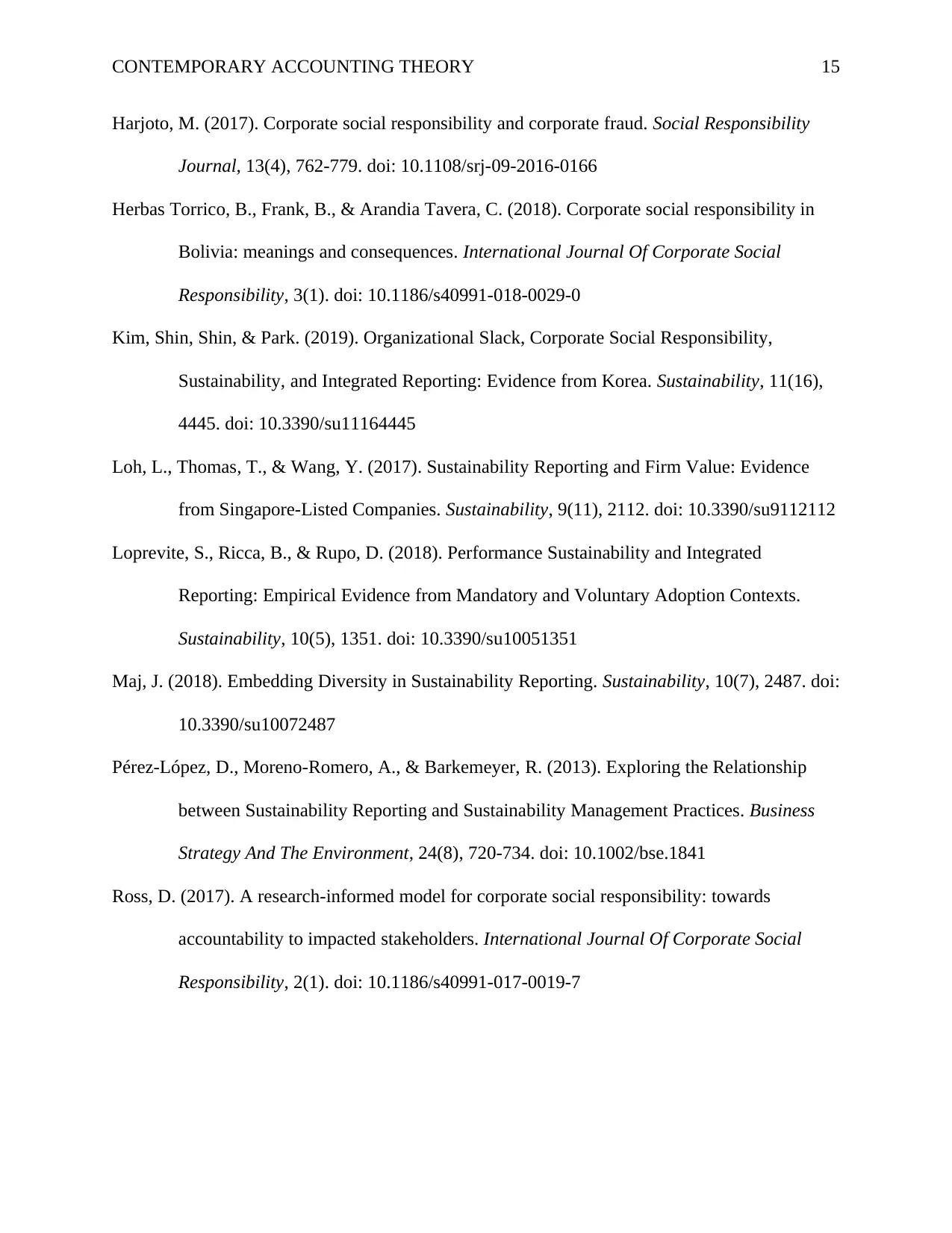
CONTEMPORARY ACCOUNTING THEORY 15
Harjoto, M. (2017). Corporate social responsibility and corporate fraud. Social Responsibility
Journal, 13(4), 762-779. doi: 10.1108/srj-09-2016-0166
Herbas Torrico, B., Frank, B., & Arandia Tavera, C. (2018). Corporate social responsibility in
Bolivia: meanings and consequences. International Journal Of Corporate Social
Responsibility, 3(1). doi: 10.1186/s40991-018-0029-0
Kim, Shin, Shin, & Park. (2019). Organizational Slack, Corporate Social Responsibility,
Sustainability, and Integrated Reporting: Evidence from Korea. Sustainability, 11(16),
4445. doi: 10.3390/su11164445
Loh, L., Thomas, T., & Wang, Y. (2017). Sustainability Reporting and Firm Value: Evidence
from Singapore-Listed Companies. Sustainability, 9(11), 2112. doi: 10.3390/su9112112
Loprevite, S., Ricca, B., & Rupo, D. (2018). Performance Sustainability and Integrated
Reporting: Empirical Evidence from Mandatory and Voluntary Adoption Contexts.
Sustainability, 10(5), 1351. doi: 10.3390/su10051351
Maj, J. (2018). Embedding Diversity in Sustainability Reporting. Sustainability, 10(7), 2487. doi:
10.3390/su10072487
Pérez-López, D., Moreno-Romero, A., & Barkemeyer, R. (2013). Exploring the Relationship
between Sustainability Reporting and Sustainability Management Practices. Business
Strategy And The Environment, 24(8), 720-734. doi: 10.1002/bse.1841
Ross, D. (2017). A research-informed model for corporate social responsibility: towards
accountability to impacted stakeholders. International Journal Of Corporate Social
Responsibility, 2(1). doi: 10.1186/s40991-017-0019-7
Harjoto, M. (2017). Corporate social responsibility and corporate fraud. Social Responsibility
Journal, 13(4), 762-779. doi: 10.1108/srj-09-2016-0166
Herbas Torrico, B., Frank, B., & Arandia Tavera, C. (2018). Corporate social responsibility in
Bolivia: meanings and consequences. International Journal Of Corporate Social
Responsibility, 3(1). doi: 10.1186/s40991-018-0029-0
Kim, Shin, Shin, & Park. (2019). Organizational Slack, Corporate Social Responsibility,
Sustainability, and Integrated Reporting: Evidence from Korea. Sustainability, 11(16),
4445. doi: 10.3390/su11164445
Loh, L., Thomas, T., & Wang, Y. (2017). Sustainability Reporting and Firm Value: Evidence
from Singapore-Listed Companies. Sustainability, 9(11), 2112. doi: 10.3390/su9112112
Loprevite, S., Ricca, B., & Rupo, D. (2018). Performance Sustainability and Integrated
Reporting: Empirical Evidence from Mandatory and Voluntary Adoption Contexts.
Sustainability, 10(5), 1351. doi: 10.3390/su10051351
Maj, J. (2018). Embedding Diversity in Sustainability Reporting. Sustainability, 10(7), 2487. doi:
10.3390/su10072487
Pérez-López, D., Moreno-Romero, A., & Barkemeyer, R. (2013). Exploring the Relationship
between Sustainability Reporting and Sustainability Management Practices. Business
Strategy And The Environment, 24(8), 720-734. doi: 10.1002/bse.1841
Ross, D. (2017). A research-informed model for corporate social responsibility: towards
accountability to impacted stakeholders. International Journal Of Corporate Social
Responsibility, 2(1). doi: 10.1186/s40991-017-0019-7
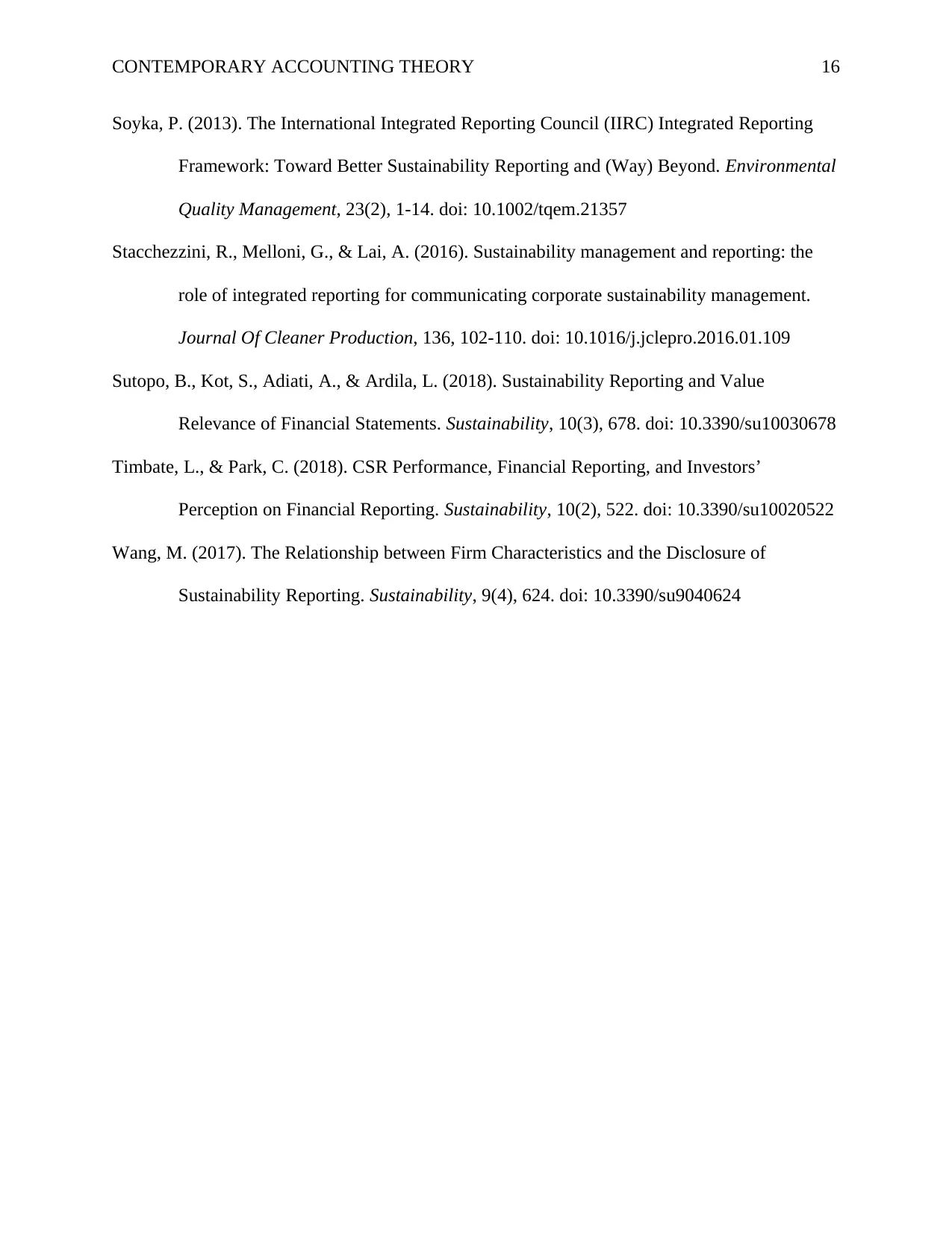
CONTEMPORARY ACCOUNTING THEORY 16
Soyka, P. (2013). The International Integrated Reporting Council (IIRC) Integrated Reporting
Framework: Toward Better Sustainability Reporting and (Way) Beyond. Environmental
Quality Management, 23(2), 1-14. doi: 10.1002/tqem.21357
Stacchezzini, R., Melloni, G., & Lai, A. (2016). Sustainability management and reporting: the
role of integrated reporting for communicating corporate sustainability management.
Journal Of Cleaner Production, 136, 102-110. doi: 10.1016/j.jclepro.2016.01.109
Sutopo, B., Kot, S., Adiati, A., & Ardila, L. (2018). Sustainability Reporting and Value
Relevance of Financial Statements. Sustainability, 10(3), 678. doi: 10.3390/su10030678
Timbate, L., & Park, C. (2018). CSR Performance, Financial Reporting, and Investors’
Perception on Financial Reporting. Sustainability, 10(2), 522. doi: 10.3390/su10020522
Wang, M. (2017). The Relationship between Firm Characteristics and the Disclosure of
Sustainability Reporting. Sustainability, 9(4), 624. doi: 10.3390/su9040624
Soyka, P. (2013). The International Integrated Reporting Council (IIRC) Integrated Reporting
Framework: Toward Better Sustainability Reporting and (Way) Beyond. Environmental
Quality Management, 23(2), 1-14. doi: 10.1002/tqem.21357
Stacchezzini, R., Melloni, G., & Lai, A. (2016). Sustainability management and reporting: the
role of integrated reporting for communicating corporate sustainability management.
Journal Of Cleaner Production, 136, 102-110. doi: 10.1016/j.jclepro.2016.01.109
Sutopo, B., Kot, S., Adiati, A., & Ardila, L. (2018). Sustainability Reporting and Value
Relevance of Financial Statements. Sustainability, 10(3), 678. doi: 10.3390/su10030678
Timbate, L., & Park, C. (2018). CSR Performance, Financial Reporting, and Investors’
Perception on Financial Reporting. Sustainability, 10(2), 522. doi: 10.3390/su10020522
Wang, M. (2017). The Relationship between Firm Characteristics and the Disclosure of
Sustainability Reporting. Sustainability, 9(4), 624. doi: 10.3390/su9040624
1 out of 16
Related Documents
Your All-in-One AI-Powered Toolkit for Academic Success.
+13062052269
info@desklib.com
Available 24*7 on WhatsApp / Email
![[object Object]](/_next/static/media/star-bottom.7253800d.svg)
Unlock your academic potential
© 2024 | Zucol Services PVT LTD | All rights reserved.





